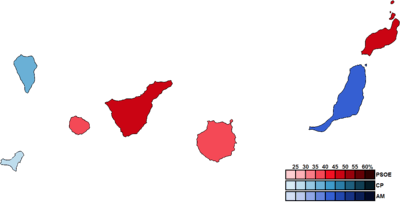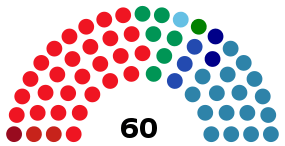Canarian regional election, 1983
|
| |||||||||||||||||||||||||||||||||||||||||||||||||||||||||||||||||||||
| |||||||||||||||||||||||||||||||||||||||||||||||||||||||||||||||||||||
All 60 seats in the Parliament of the Canary Islands 31 seats needed for a majority | |||||||||||||||||||||||||||||||||||||||||||||||||||||||||||||||||||||
|---|---|---|---|---|---|---|---|---|---|---|---|---|---|---|---|---|---|---|---|---|---|---|---|---|---|---|---|---|---|---|---|---|---|---|---|---|---|---|---|---|---|---|---|---|---|---|---|---|---|---|---|---|---|---|---|---|---|---|---|---|---|---|---|---|---|---|---|---|---|
| Opinion polls | |||||||||||||||||||||||||||||||||||||||||||||||||||||||||||||||||||||
| Registered | 925,572 | ||||||||||||||||||||||||||||||||||||||||||||||||||||||||||||||||||||
| Turnout | 578,570 (62.5%) | ||||||||||||||||||||||||||||||||||||||||||||||||||||||||||||||||||||
| |||||||||||||||||||||||||||||||||||||||||||||||||||||||||||||||||||||
 Constituency results map for the Parliament of the Canary Islands | |||||||||||||||||||||||||||||||||||||||||||||||||||||||||||||||||||||
| |||||||||||||||||||||||||||||||||||||||||||||||||||||||||||||||||||||
The 1983 Canarian regional election was held on Sunday, 8 May 1983, to elect the 1st Parliament of the Autonomous Community of the Canary Islands. All 60 seats in the Parliament were up for election. The election was held simultaneously with regional elections in twelve other autonomous communities and local elections all throughout Spain.
The Spanish Socialist Workers' Party (PSOE) emerged as the largest party in the archipelago with 27 seats (4 short of an overall majority), following the disintegration and dissolution of the Union of the Democratic Centre (UCD), former ruling party of Spain in the 1977-1982 period which had achieved virtually unopposed victories in the islands in the 1977 and 1979 general elections. As a result, the centre and centre-right vote became split between several small parties and splits from the UCD, such as the Democratic and Social Centre of former Spanish Prime Minister Adolfo Suárez, which entered Parliament with 6 seats; the Independents' Gomera Group (AGI), with 2 seats or the Canarian Nationalist Convergence (CNC), with 1 seat.
The People's Coalition, a party coalition comprising the People's Alliance (AP), the People's Democratic Party (PDP) and the Liberal Union (UL) became the second largest party and the main opposition force in the Parliament with 17 seats, while the also-nationwide Communist Party of Spain (PCE) obtained 1 seat.
Overview
Electoral system
The Parliament of the Canary Islands was the devolved, unicameral legislature of the autonomous community of the Canary Islands, having legislative power in regional matters as defined by the Spanish Constitution and the Canarian Statute of Autonomy, as well as the ability to vote confidence in or withdraw it from a President of the Government.[1] Voting for the Parliament was on the basis of universal suffrage, which comprised all nationals over eighteen, registered in the Canary Islands and in full enjoyment of their political rights.
The 60 members of the Parliament of the Canary Islands were elected using the D'Hondt method and a closed list proportional representation, with a threshold of 20 percent of valid votes—which included blank ballots—being applied in each constituency. Parties not reaching the threshold were not taken into consideration for seat distribution. Alternatively, parties could also enter the seat distribution as long as they reached 3 percent regionally. Seats were allocated to constituencies, corresponding to the islands of El Hierro, Fuerteventura, Gran Canaria, La Gomera, La Palma, Lanzarote and Tenerife. Each constituency was allocated a fixed number of seats: 3 for El Hierro, 7 for Fuerteventura, 15 for Gran Canaria, 4 for La Gomera, 8 for La Palma, 8 for Lanzarote and 15 for Tenerife.[1]
The electoral law provided that parties, federations, coalitions and groupings of electors were allowed to present lists of candidates. However, groupings of electors were required to secure the signature of at least 0.1 percent of the electors registered in the constituency for which they sought election—needing to secure, in any case, the signature of 500 electors—. Electors were barred from signing for more than one list of candidates. Concurrently, parties and federations intending to enter in coalition to take part jointly at an election were required to inform the relevant Electoral Commission within fifteen days of the election being called.[2]
Election date
The Government of Spain, in coordination with the Junta of the Canary Islands, was required to call an election to the Parliament of the Canary Islands within from 1 February to 31 May 1983. In the event of an investiture process failing to elect a regional President within a two-month period from the first ballot, the Parliament was to be automatically dissolved and a snap election called, with elected deputies merely serving out what remained of their four-year terms.[1]
Opinion polls
The table below lists voting intention estimates in reverse chronological order, showing the most recent first and using the dates when the survey fieldwork was done, as opposed to the date of publication. Where the fieldwork dates are unknown, the date of publication is given instead. The highest percentage figure in each polling survey is displayed with its background shaded in the leading party's colour. If a tie ensues, this is applied to the figures with the highest percentages. The "Lead" column on the right shows the percentage-point difference between the parties with the highest percentages in a given poll. When available, seat projections are also displayed below the voting estimates in a smaller font. 31 seats were required for an absolute majority in the Parliament of the Canary Islands.
| Polling firm/Commissioner | Fieldwork date | Sample size | Turnout | UPC | CNC | AC | AM | AGI | AHI | Lead | ||||||
|---|---|---|---|---|---|---|---|---|---|---|---|---|---|---|---|---|
| 1983 regional election | 8 May 1983 | N/A | 62.5 | 41.2 27 |
28.8 17 |
8.2 2 |
7.2 6 |
4.3 1 |
w.UPC | 4.4 1 |
1.0 3 |
0.6 2 |
0.2 1 |
12.4 | ||
| Sofemasa/El País[p 1][p 2] | 23–26 Apr 1983 | ? | ? | ? 35/40 |
? 12/20 |
– | – | – | – | – | ? 3/4 |
– | – | ? | ||
| 1982 general election | 28 Oct 1982 | N/A | 76.0 | 36.7 | 26.9 | 5.4 | 4.9 | 3.9 | 2.9 | w.AC | – | – | – | 9.8 | ||
Results
Overall
 | ||||||
| Parties and coalitions | Popular vote | Seats | ||||
|---|---|---|---|---|---|---|
| Votes | % | ±pp | Total | +/− | ||
| Spanish Socialist Workers' Party (PSOE) | 233,991 | 41.18 | n/a | 27 | n/a | |
| People's Coalition (AP–PDP–UL) | 163,419 | 28.76 | n/a | 17 | n/a | |
| Canarian People's Union–Canarian Assembly (UPC–AC) | 46,784 | 8.23 | n/a | 2 | n/a | |
| Democratic and Social Centre (CDS) | 40,789 | 7.18 | n/a | 6 | n/a | |
| Communist Party of the Canaries (PCC) | 24,868 | 4.38 | n/a | 1 | n/a | |
| Canarian Nationalist Convergence (CNC) | 24,376 | 4.29 | n/a | 1 | n/a | |
| Party of the Canarian Country (PPC) | 7,676 | 1.35 | n/a | 0 | n/a | |
| Majorera Assembly (AM) | 5,551 | 0.98 | n/a | 3 | n/a | |
| Workers' Socialist Party (PST) | 3,909 | 0.69 | n/a | 0 | n/a | |
| Gomera Group of Independents (AGI) | 3,294 | 0.58 | n/a | 2 | n/a | |
| Independents from Lanzarote Group (AIL) | 2,718 | 0.48 | n/a | 0 | n/a | |
| Seven Green Stars (SEV) | 2,709 | 0.48 | n/a | 0 | n/a | |
| Revolutionary Communist League (LCR) | 1,784 | 0.31 | n/a | 0 | n/a | |
| Popular Struggle Coalition (CLP) | 1,010 | 0.18 | n/a | 0 | n/a | |
| Independent Herrenian Group (AHI) | 944 | 0.17 | n/a | 1 | n/a | |
| Blank ballots | 4,418 | 0.78 | n/a | |||
| Total | 568,240 | 60 | n/a | |||
| Valid votes | 568,240 | 98.21 | n/a | |||
| Invalid votes | 10,330 | 1.79 | n/a | |||
| Votes cast / turnout | 578,570 | 62.51 | n/a | |||
| Abstentions | 347,002 | 37.49 | n/a | |||
| Registered voters | 925,572 | |||||
| Sources[3][4][5] | ||||||
Distribution by constituency
| Constituency | PSOE | CP | UPC–AC | CDS | PCC | CNC | AM | AGI | AHI | |||||||||
|---|---|---|---|---|---|---|---|---|---|---|---|---|---|---|---|---|---|---|
| % | S | % | S | % | S | % | S | % | S | % | S | % | S | % | S | % | S | |
| El Hierro | 28.5 | 1 | 29.9 | 1 | 14.0 | − | 27.6 | 1 | ||||||||||
| Fuerteventura | 13.8 | 1 | 18.4 | 1 | 22.8 | 2 | 45.0 | 3 | ||||||||||
| Gran Canaria | 39.0 | 7 | 28.3 | 5 | 9.5 | 1 | 5.3 | 1 | 4.5 | − | 9.1 | 1 | ||||||
| La Gomera | 39.2 | 2 | 15.2 | − | 7.3 | − | 38.3 | 2 | ||||||||||
| La Palma | 32.0 | 3 | 37.4 | 3 | 15.8 | 1 | 14.8 | 1 | ||||||||||
| Lanzarote | 47.4 | 5 | 18.2 | 2 | 12.0 | 1 | 4.7 | − | 4.3 | − | ||||||||
| Tenerife | 46.9 | 8 | 30.4 | 5 | 9.8 | 1 | 7.2 | 1 | 2.7 | − | ||||||||
| Total | 41.2 | 27 | 28.8 | 17 | 8.2 | 2 | 7.2 | 6 | 4.4 | 1 | 4.3 | 1 | 1.0 | 3 | 0.6 | 2 | 0.2 | 1 |
References
- Opinion poll sources
- ↑ "Holgada mayoría socialista en el Parlamento autonómico". El País (in Spanish). 1 May 1983.
- ↑ "Ficha técnica de los sondeos". El País (in Spanish). 1 May 1983.
- Other
- 1 2 3 "Statute of Autonomy of the Canary Islands of 1982". Organic Law No. 10 of 10 August 1982. Official State Gazette (in Spanish). Retrieved 12 September 2017.
- ↑ "Electoral Rules Decree of 1977". Royal Decree-Law No. 20 of 18 March 1977. Official State Gazette (in Spanish). Retrieved 27 December 2016.
- ↑ "Electoral Information System in the Canary Islands". parcan.es (in Spanish). Canarian Institute of Statistics. Retrieved 30 September 2017.
- ↑ "Election Results in the Canary Islands (1979-1987)" (PDF). datosdelanzarote.com (in Spanish). Statistics and Documentation Center of the Canary Islands. November 1987. Retrieved 30 September 2017.
- ↑ "Parliament of the Canary Islands elections since 1983". historiaelectoral.com (in Spanish). Electoral History. Retrieved 30 September 2017.
.jpg)

.jpg)